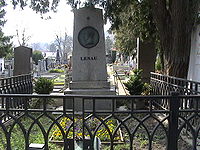- Nikolaus Lenau
-
Nikolaus Lenau was the nom de plume of Nikolaus Franz Niembsch Edler von Strehlenau (25 August 1802, Schadat, near Temesvár, Hungary – 22 August 1850, Oberdöbling, near Vienna), was a German language Austrian poet.
Biography
He was born at Schadat near Temeschwar in Hungary, now Lenauheim, Romania. His father, a Habsburg government official, died at Budapest in 1807, leaving his children in the care of their mother, who in 1811 married again. In 1819 Nikolaus went to the University of Vienna; he subsequently studied Hungarian law at Pozsony (Bratislava) and then spent the best part of four years in qualifying himself in medicine. Unable to settle down to any profession, he had already begun to write verse; and the disposition to sentimental melancholy inherited from his mother, stimulated by disappointments in love and by the prevailing fashion of the romantic school of poetry, descended into gloom after his mother's death in 1829.
Soon afterwards, a legacy from his grandmother enabled him to devote himself wholly to poetry. His first published poems appeared in 1827, in Johann Gabriel Seidl's Aurora. In 1831 he went to Stuttgart, where he published a volume of Gedichte (1832) dedicated to the Swabian poet, Gustav Schwab. Here he also made the acquaintance of Ludwig Uhland, Justinus Kerner, Karl Mayer and others; but his restless spirit longed for change, and he determined to seek for peace and freedom in America.
In October 1832 he landed at Baltimore and settled on a homestead in Ohio. He also lived six months in New Harmony, Indiana, with a group called the Harmony Society. But the reality of life in the primeval forest fell lamentably short of the ideal he had pictured; he disliked the Americans with their eternal English lisping of dollars (englisches Talergelispel); and in 1833 he returned to Germany, where the appreciation of his first volume of poems revived his spirits.
From then on he lived partly in Stuttgart and partly in Vienna. In 1836 appeared his Faust, in which he laid bare his own soul to the world [1]); in 1837, Savonarola, an epic in which freedom from political and intellectual tyranny is insisted upon as essential to Christianity. In 1838 his Neuere Gedichte proved that Savonarola had been the result of a passing exaltation. Of these new poems, some of the finest were inspired by his hopeless passion for Sophie von Löwenthal, the wife of a friend. In 1842 appeared Die Albigenser, and in 1844 he began writing his Don Juan, a fragment of which was published after his death.
Soon afterwards his never well-balanced mind began to show signs of aberration, and in October 1844 he was placed under restraint (after jumping out of a window one morning and running down a street, while shouting "Revolt! Freedom! Help! Fire!" [2]) for the rest of his life. He died in the asylum at Oberdöbling near Vienna and was buried in the cemetery of Weidling, near Klosterneuburg.
On his grave is the replica of an open book with an extract from one of his poems (An Frau Kleyle) inscribed on the lefthand page, while on the righthand page there is the final stanza from his poem Vergangenheit. The city of Stockerau in Lower Austria has proclaimed itself the "Lenau City", because Nikolaus Lenau went on extensive walks in the alluvial forests next to Stockerau and the Danube and was inspired to write one of his most famous lyric poems, "Schilflieder", during this time. He has various streets and squares named after him in Vienna and the surrounding area.
Lenau's fame rests mainly upon his shorter poems; even his epics are essentially lyric in quality. His excellent poem, "Herbst", expresses the sadness and melancholy he felt after his sojourn in the United States and his strenuous travels across the Atlantic to return to Europe. In it, he mourns the loss of youth, the passing of time and his own sense of futility. The poem is archetypal of Lenau's style and culminates with the speaker dreaming of death as a final escape from emptiness. He is the greatest modern lyric poet of Austria, and the typical representative in German literature of that pessimistic Weltschmerz which, beginning with Lord Byron, reached its culmination in the poetry of Giacomo Leopardi.
Lenau's Sämtliche Werke were first published in 4 vols. by Anastasius Grün in 1855, but there are several more modern editions, as those by Max Koch in Joseph Kürschner's Deutsche Nationalliteratur of 1888 (vols. 154 and 155), and E. Castle (2 vols., 1900).
References
 This article incorporates text from a publication now in the public domain: Chisholm, Hugh, ed (1911). "Lenau, Nikolaus". Encyclopædia Britannica (11th ed.). Cambridge University Press. This source in turn cites:
This article incorporates text from a publication now in the public domain: Chisholm, Hugh, ed (1911). "Lenau, Nikolaus". Encyclopædia Britannica (11th ed.). Cambridge University Press. This source in turn cites:
- E. Castle, Lenau und die Familie Löwenthal (1906).
- L. A. Frankl, Ein Lenaus Biographie (1854, 2nd ed,, 1885).
- L. A. Frankl, Lenaus Tagebuch und Briefe an Sophie Löwenthal (1891).
- A. Marchand, Les Poètes lyriques de l'Autriche (1881).
- L. Roustan, Lenau et son temps (1898).
- A. Schlossar, Lenaus Briefe an die Familie Reinbeck (1896).
- A. Schurz, Lenaus Leben, grösstenteils aus des Dichters eigenen Briefen (1855).
External links
- Internationale Lenau-Gesellschaft (German)
- Poems of Nikolaus Lenau (German)
- Nicolaus Lenau Links
- Free scores by Nikolaus Lenau in the Choral Public Domain Library (ChoralWiki)
Categories:- Austrian poets
- German-language poets
- Danube-Swabian people
- People from Timiş County
- 1802 births
- 1850 deaths
- Poètes maudits
Wikimedia Foundation. 2010.


